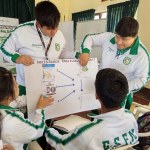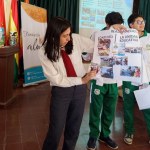This year, we have deepened our commitment to the initial training of teachers in Tarija. We have had the opportunity to experience firsthand one of the main challenges of the training process: ensuring that, from the first courses, theory and practice are effectively articulated, driving the strengthening of the knowledge, skills, and motivation of future teachers. Although this coordination is provided for in the regulations, in the educational context it is not always fully realized.
Aware of this need, this year we held training and support sessions for students before they begin their Community Educational Internships (CEP). In these spaces, we not only provided essential tools for their performance, but also offered pedagogical support to ensure that the tools, plans, and strategies they will use in their internships are aligned with the regulations and respond to the real challenges faced in the classroom.
In June, with more than 70 first-year students, we held workshops on an in-depth analysis of the educational reality: what it consists of, how the different actors interact, and what the role of the teacher is within this complex network. We sought to help students understand that teaching is not limited to the classroom; it involves understanding the context, recognizing the needs of the environment, and understanding how these dynamics are reflected in curriculum management documents (PDC, PAT, PSP), which are not mere requirements but vital tools for organizing, managing, and bringing education to life.
We believe this training approach was valuable because it allowed what they learned in our workshops, complementing what is taught in the ESFM classrooms, to be translated into concrete actions during their IEPC-PEC. We were able to observe how many students came to understand the complexity of teaching and the importance of prior planning. Another new aspect was how these experiences can define their emotional relationship with the profession: sometimes deeply motivating, and other times, unfortunately, demotivating.
Now, seeing this new emotional factor in students and their vocation, we believe that Alma’s work must also go beyond the pedagogical; it must touch the personal and emotional aspects of future teachers. We want them to know the real difficulties, challenges, and opportunities they will encounter in the classroom, to experience firsthand the importance of learning pedagogical strategies, curriculum planning, and understanding the educational context. But we must also strive to maintain a genuine interest in teaching, a vocation that drives them to continue learning and face the challenges of being a teacher with commitment and hope.
As the coordinator in Tarija, I know we have made great progress in training future teachers, but I also see that we have more to do. And I am also certain that the new challenges we discover every day do not discourage us; on the contrary, they inspire us to continue innovating, seeking more personal and meaningful ways to support students and ignite in them that motivation that, we are convinced, is at the heart of teaching.
By:
Leydi Osorio Ramos


Training workshop for first-year students at the ESFM “Juan Misael Saracho”.
